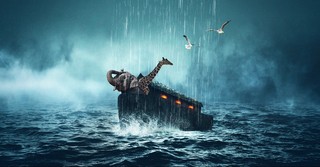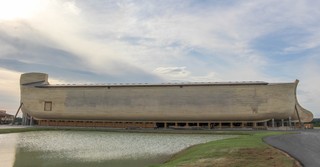What Is Noah's Ark and What Does It Teach about Who God Is?
Share

About 1700 years after He created the earth, God covered it with a great Flood. Every person, bird, and land animal drowned, except those on the ark. Noah’s ark was an enormous boat that safely carried him and his family through the Flood. Their rescue and the Flood itself show us the Lord’s justice, power, patience, kindness, and faithfulness. The story, while true, also points to a greater truth – the Ark God offers us.
Photo credit: © iStock/Getty Images Plus/Javier_Art_Photography
What Is Noah's Ark?

When we picture Noah’s ark, we often think of the nursery décor version – a tiny, round boat bobbing along with giraffe heads poking out the top. God’s blueprints for the ark, laid out in Genesis 6:14-16, describe something a bit different.
The Lord told Noah to build a 3-story wooden ark with rooms inside and to coat it with pitch. The Hebrew word we translate as “ark” means a box or storage chest. Pitch is a black, sticky waterproofing material that can be made from pine trees. The ark sounds more like a black barge than a tan teacup.
The dimensions are staggering – 450 ft long (1 ½ football fields), 75 ft wide, and 45ft high. For comparison, the title of World’s Tallest Giraffe is currently held by Forest, who stands at 18 feet, 8 inches. This boat covered over ¾ of an acre.
God also told Noah to store on the ark portions of every kind of food, enough for his family and two of each kind of animal. He made clear that the only way to survive the coming Flood was to be on the ark. Noah got to work and followed God’s instructions to the letter (Genesis 6:17-22).
When the ark was completed and all were aboard, God shut them in. That very day, “all the springs of the great deep burst forth, and the floodgates of the heavens were opened.” It rained for 40 days straight. Floodwaters covered the peaks of the highest mountains for 7 ½ months. Over a year after Noah boarded the ark, the waters finally went down enough for him to step out onto dry land. He built an altar in worship to the God who had saved him, and the Lord promised never again to destroy the earth with water (Genesis 7:1-9:17).
Photo credit: Ark Encounter/Pixabay
Why Did God Flood the Whole World?

God is holy – perfect and pure, set apart from anything sinful. Sin separates us from the Lord because He cannot embrace wickedness. He is just – He always does the right thing – and He cannot turn a blind eye to sin. If He picked and chose when He would tolerate evil and who He would allow to sin, He would be unjust and unpredictable.
But the Lord hates all sin and loves all people. When He looked down upon the beautiful world He had made and saw His beloved people killing and beating and mocking and stealing from each other, “His heart was filled with pain.” He peered into their hearts and saw that their thoughts were bent on evil all the time. Grieved that the people He had made were so full of wickedness and violence, God wiped the slate clean by destroying every living thing not on the ark (Genesis 6:5-12).
We then might wonder if God made a mistake when He created the world. Did He miss a step or botch Adam’s design? Ephesians 1:4 and 2 Timothy 1:9 are two of the many verses that tell us that our Lord knew what He was doing. He knew before He even created the planet that every human who walked on it would be full of selfishness and pride. During the Flood, he spared humanity from total destruction, knowing full well that He would one day sacrifice His Son to save us again.
Why Did God Save Noah and His Family?
A consistent theme woven throughout history is God’s perfect justice – not only in faithfully punishing sin, but also in faithfully rescuing the few who trust in Him. When the Lord rained burning sulfur on Sodom, (a city full of arrogant, greedy women and men eager to rape anyone they could get their hands on) He spared a believer named Lot. When Lot hesitated to leave, angels grasped his hand and the hands of his wife and daughters and led them to safety, “for the Lord was merciful to them” (Genesis 19:1-16, Ezekiel 16:49).
Among all the quarreling, backstabbing, greedy humans, Noah must have stood out like a sore thumb. Genesis 6:8-9 says he was a good man who had a good relationship with God. In His mercy, the Lord chose to spare Noah and his wife and his sons and their wives. He did so not because Noah and his family were perfect, but because they believed Him. Noah built the ark because He believed that God really would bring the Flood and really would save him (Hebrews 11:7).
Photo credit: Unsplash/Geetanjal Khanna
What Does This Story Teach Us about God's Character?

The Lord’s conversations with Noah reveal a kind, patient, and thoughtful God. The destruction and timing of the Flood reveal His ultimate power.
1. God Is Kind
God’s love for Noah is evident in His careful, specific instructions. Noah was not left to wonder how big the ark should be or what materials to use. He had a heads up about all the animals that would be joining him, so he could prepare food and space for them. (Can you imagine if all those creatures had started trooping toward him without warning?)
A week before the Flood, the Lord gave Noah a priceless gift. He told him which day the Flood would start and exact number of days the rains would last (Genesis 7:4). God freed Noah from worrying about when to board the ark. And the Lord knew that after the fourth or fifth day of unending rain, any human would wonder if it were ever going to end. God relieved Noah and his family of that anxiety.
And when it was all over, the Lord gave Noah and his family another gift. He promised He would never again destroy the earth by water. After all they had been through, the next raindrop would have struck fear in their hearts. But God didn’t want them to be frightened every time it rained. He painted a rainbow across the sky, a lovely symbol of His promise, like a colorful wedding ring.
2. God Is All-Powerful
The rains began and ended precisely when God said they would. He is in complete control of the wind and the waves (Mark 4:35-41). 1 Peter 3:20-21 tells us that the Lord waited patiently until the ark was finished before bringing judgement on the world. These verses also explain that the waters of the Flood represent the cleansing power of Jesus’ resurrection. Nothing else can wash away our sin and make us right with God. Only Jesus has the power to save us.
God is powerful enough to fulfill His every promise. 2 Peter 3:3-15 warns us that the same might that created the universe and flooded the entire world will someday destroy the heavens and the earth by fire. “The Lord is not slow in keeping His promise…. He is patient with you, not wanting anyone to perish, but everyone to come to repentance.”
Matthew 24:36-44 compares the Flood with Jesus’ Second Coming and the Judgement. In Noah’s day, people were going about their business and were caught by surprise when the Flood swept them away. In the same way, there will be no additional warning before Jesus comes again to judge the world. No one will be able to predict the timing of His return.
God will certainly bring judgement, for He always, always keeps His word. His unswerving commitment to follow through on His promises and the fact that He has the power to do so should strike fear into the heart of anyone in rebellion against Him. But for those who are safe in the ark, God’s steadfast faithfulness and unlimited power are sources of comfort and confidence (Hebrews 10:19-23).
Photo credit: ©Getty Images/Christian Chan
God Is Faithful to Save

God not only promised justice in the form of fiery, worldwide judgement, but He also built an ark. He invites all who would be saved to come aboard. The breathtaking part is that He loved you so much, was so determined to rescue you, that He sent His own Son to take your punishment so you can live.
Jesus offers Himself as your ark. When He walked the earth, He said, “I am the way and the truth and the life. No one comes to the Father except through me.” (John 14:6). He said, “I am the gate. Whoever enters through me will be saved….” (John 10:9).
If we refuse to get on the ark, as did the scoffers of Noah’s day, we have chosen death (John 3:17-18). But if we are safe in the arms of Jesus, we can say with the Psalmist:
“Then I acknowledged my sin to you
and did not cover up my iniquity.I said, “I will confess
my transgressions to the Lord.”And you forgave
the guilt of my sin.Therefore let all the faithful pray to you
while you may be found;surely the rising of the mighty waters
will not reach them.You are my hiding place;
you will protect me from trouble
and surround me with songs of deliverance”(Psalm 32:5-7).
The Door Stands Open
In Hebrews 11:6-7, God points to Noah as an example of a man of faith. “Without faith, it is impossible to please God, because anyone who comes to Him must believe that he exists and that He rewards those who earnestly seek Him.”
What is faith? Hebrews 11:1 tells us “faith is being sure of what we hope for and certain of what we do not see.” Faith is letting go of all attempts to be good enough, to measure up, to build your own ark. Faith gives you eyes to see that all the good deeds you’ve nailed together can’t save you any more than a ladder or tower could have saved Noah from the Flood. Faith trusts God that His way, His ark, will hold you safe.
If you struggle to believe in a God you cannot see, you are not alone. Living in bodies of flesh and walking in a physical world, we all strain to grasp the spiritual. Pray with the man who stood face to face with Jesus and still cried, “I do believe; help me overcome my unbelief!” (Mark 9:24).
The essence of faith is throwing yourself on Jesus’ mercy and admitting that you can’t hack it on your own. Acknowledge that you do not have the faith or the goodness or the power to make yourself right with God, to wash away the shame of your sin. Beg him to help you. And know that He will (Matthew 7:7-8 and 1 John 1:9).
Photo credit: ©Unsplash/Cherry Laithang
